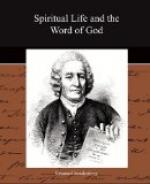Everyone is able from natural freedom to shun these same evils because of their being contrary to human laws. This every citizen of a kingdom does who fears the penalties of the civil law, or the loss of life, reputation, honor, wealth, and thus of office, gain, and pleasures; even an evil man does this. And the life of such a man appears exactly the same in external form as the life of one who shuns these evils because they are contrary to the Divine laws; but in internal form it is wholly unlike it. The one acts from natural freedom only, which is from man; the other acts from spiritual freedom, which is from the Lord; both acting from freedom. When a man is able to shun these same evils from natural freedom, why is he not able to shun them from spiritual freedom, in which he is constantly held by the Lord, provided he thinks to will this because there is a heaven, a hell, a life after death, punishment and reward, and prays to the Lord for help?
Let it be noted, that every man when he is beginning the spiritual life because he wishes to be saved, fears sins on account of the punishments of hell, but afterward on account of the sin itself, because it is in itself abominable, and finally on account of the truth and good that he loves, thus for the Lord’s sake. For so far as anyone loves truth and good, thus the Lord, he so far turns away from what is contrary to these, which is evil. All this makes clear that he that believes in the Lord shuns evils as sins; and conversely, he that shuns evils as sins believes; consequently to shun evils as sins is the sign of faith. (A.E., n. 936.)
But as all the evils into which man is born derive their roots from a love of ruling over others and from a love of possessing the goods of others, and all the delights of man’s own life flow forth from these two loves, and all evils are from them, so the loves and delights of these evils belong to man’s own life. And since evils belong to the life of man, it follows that man from himself can be no means refrain from them, for this would be from his own life to refrain from his own life. An ability to refrain from them of the Lord is therefore provided, and that he may have this ability the freedom to think that which he wills and to pray to the Lord for help is granted him. He has this freedom because he is in the middle between heaven and hell, consequently between good and evil. And being in the middle he is in equilibrium; and he who is in equilibrium is able easily and as of his own accord to turn himself the one way or the other; and the more so because the Lord continually resists evils and repels them, and raises man up and draws him to Himself. And yet there is combat, because the evils which belong to man’s life are stirred up by the evils that unceasingly rise up from hell; and then man must fight against them, and, indeed, as if of himself. If he does not fight as if of himself the evils are not set aside. (A.E., n. 938.)




